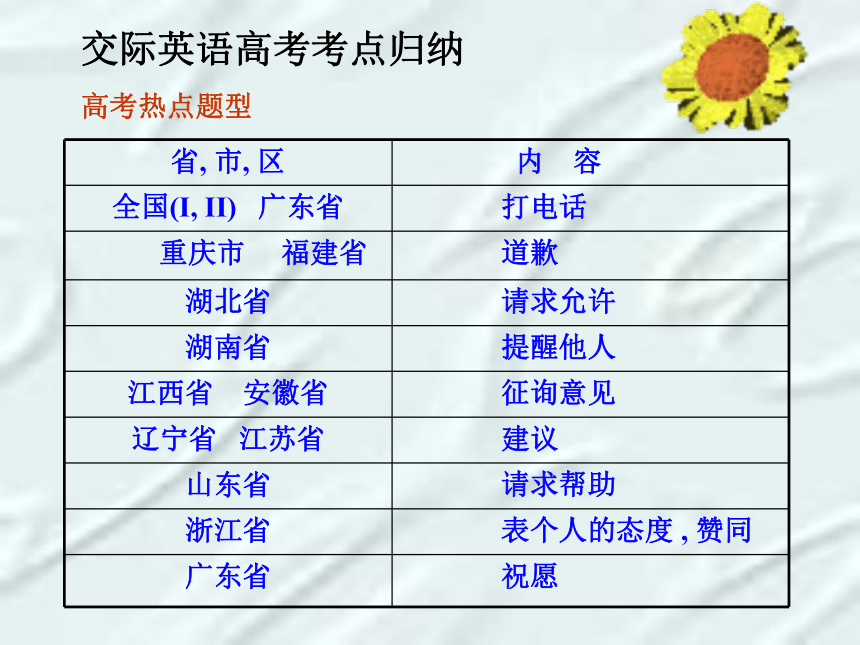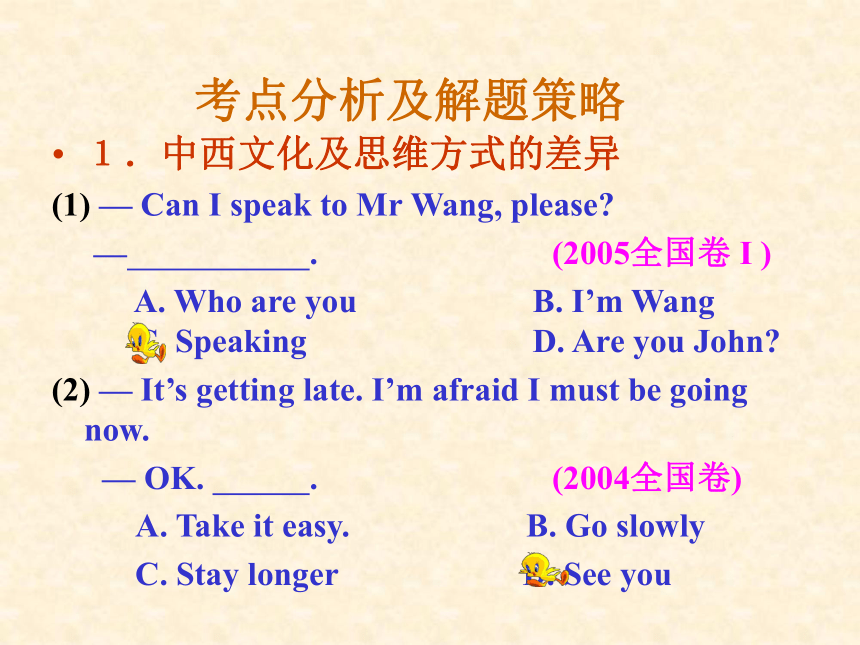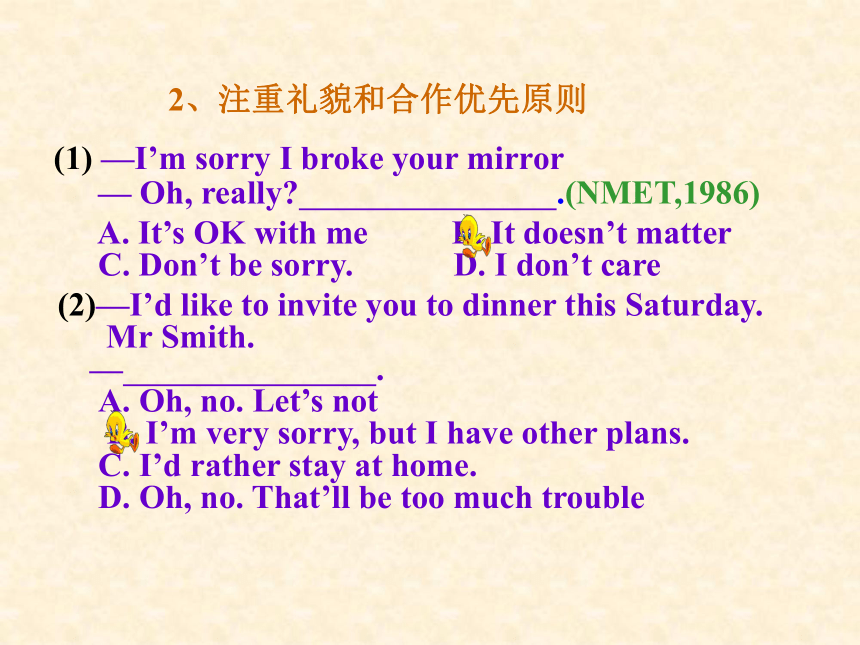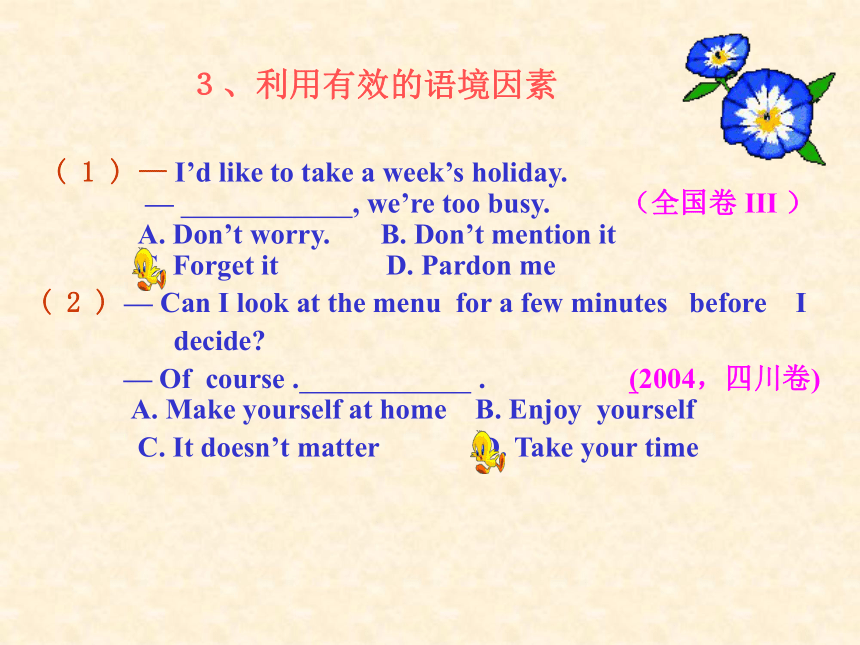高考情景交际用语考点归纳[下学期]
图片预览







文档简介
课件14张PPT。
情景交际用语考点归纳交际英语高考考点归纳
高考热点题型 考点分析及解题策略1.中西文化及思维方式的差异
(1) — Can I speak to Mr Wang, please?
— . (2005全国卷 I )
A. Who are you B. I’m Wang C. Speaking D. Are you John?
(2) — It’s getting late. I’m afraid I must be going now.
— OK. . (2004全国卷)
A. Take it easy. B. Go slowly
C. Stay longer D. See you (1) —I’m sorry I broke your mirror — Oh, really? .(NMET,1986)
A. It’s OK with me B. It doesn’t matter C. Don’t be sorry. D. I don’t care
(2)—I’d like to invite you to dinner this Saturday. Mr Smith. — . A. Oh, no. Let’s not B. I’m very sorry, but I have other plans. C. I’d rather stay at home. D. Oh, no. That’ll be too much trouble
2、注重礼貌和合作优先原则 ( 1 ) — I’d like to take a week’s holiday. — , we’re too busy. (全国卷 III ) A. Don’t worry. B. Don’t mention it C. Forget it D. Pardon me
( 2 ) — Can I look at the menu for a few minutes before I
decide?
— Of course . . (2004,四川卷) A. Make yourself at home B. Enjoy yourself
C. It doesn’t matter D. Take your time
3、利用有效的语境因素4、注意语言的衔接(1) —I think George doesn’t really care for TV plays. —Right, he still watches the program. (2004,重庆卷) A. and B. but C. or D. so
(2) No, I’m afraid he isn’t in. This is his secretary speaking. Can I help you ?
— . (2004广东卷)
A. Oh, you will. B. Oh, that’s a pity .
C. I should think so .
D. Well. I look forward to hearing from you.
2) –I think you should phone Jenny and say sorry to her.
-- ______. It was her fault.
A. No way B. Not possible
C. No chance D. Not at all 1. — Do you think our basketballers played very well yesterday?
— _________.
A. They were not nervous at all B. They were still young
C. They played naturally D. They couldn’t have done better5.言语含义2. — I think you should phone Jenny and say sorry to her.
— ______. It was her fault.
A. No way B. Not possible
C. No chance D. Not at all1. —Shall I help you with that suitcase? — . A. It’s all right, thanks. B. Yes, go ahead please. C. I don’t want to trouble you too much D. No, please don’t do it
2. —I’d like to invite you to dinner this Saturday, Mr Smith. — . A. Oh, no. Let’s not B. I’m very sorry, but I have other plans. C. I’d rather stay at home. D. Oh, no. That’ll be too much trouble
3 —How long are you staying? —I don’t know. . A. That’s OK B. Never mind. C. It depends. D. It doesn’t matter
Practice4. —I’m afraid I can’t finish the book in this week. — . A. Please go ahead B. That’s all right. C. Not at all. D. Take your time.
5. — Could you do me a favor and take these books to my office? —Yes, . A. for pleasure B. I could. C. my pleasure. D. with pleasure.
6. —Oh, must you? Stay a bit longer. It’s been such fun having you. — , but I’ve got an early start tomorrow morning. A. No problem B. All right. C. thanks any way D. Never mind
8. —Beijing Airport, please, I’ll be there by ten. — , but I’ll do my best. A. No problem B. All right. C. I can’t promise. D. It’s impossible9. —Thank you ever so much for the book you sent me. — . (上海1997) A. No thanks. B. I’m glad you like it C. Please don’t say so D. No, it’s not so good10.—Go for a picnic this weekend. Ok? — . I love getting close to nature. (福建2004) A. I couldn’t agree more. B. I’m afraid not C. I believe not D. I don’t think so.11. — Now , where is my purse? — _____, We’ll be late for the picnic. A. Take your time B. Don’t worry C. come on D. Take it easy 12 — I didn’t hear you really. —I was saying that the party was great. (2004,辽宁卷) A. Repeat. B. Once again C. Sorry? D. So what? 13. — I’m afraid Mr.Wood can’t see you until 4 o’clock. — Oh,_________ I won’t wait. (2005浙江) A. no doubt B. after all C. in that case D. in this way14. —I’m terribly sorry I broke your glass.
— . (安徽2005) A. That’s right. B. Bad luck C. Sorry. D. You can forget it.
15. —Do you think I could borrow your bicycle?
— . (浙江2005) A. How came? B. Take your time. C. Yes, go on. D. Yes, help yourself
Summary: 1.注意中西文化及思维方式的差异
2.注重礼貌和合作优先原则
3. 利用有效的语境因素
4.注意语言的衔接
5. 注意言语含义
Thank you !GOOD BYE !
情景交际用语考点归纳交际英语高考考点归纳
高考热点题型 考点分析及解题策略1.中西文化及思维方式的差异
(1) — Can I speak to Mr Wang, please?
— . (2005全国卷 I )
A. Who are you B. I’m Wang C. Speaking D. Are you John?
(2) — It’s getting late. I’m afraid I must be going now.
— OK. . (2004全国卷)
A. Take it easy. B. Go slowly
C. Stay longer D. See you (1) —I’m sorry I broke your mirror — Oh, really? .(NMET,1986)
A. It’s OK with me B. It doesn’t matter C. Don’t be sorry. D. I don’t care
(2)—I’d like to invite you to dinner this Saturday. Mr Smith. — . A. Oh, no. Let’s not B. I’m very sorry, but I have other plans. C. I’d rather stay at home. D. Oh, no. That’ll be too much trouble
2、注重礼貌和合作优先原则 ( 1 ) — I’d like to take a week’s holiday. — , we’re too busy. (全国卷 III ) A. Don’t worry. B. Don’t mention it C. Forget it D. Pardon me
( 2 ) — Can I look at the menu for a few minutes before I
decide?
— Of course . . (2004,四川卷) A. Make yourself at home B. Enjoy yourself
C. It doesn’t matter D. Take your time
3、利用有效的语境因素4、注意语言的衔接(1) —I think George doesn’t really care for TV plays. —Right, he still watches the program. (2004,重庆卷) A. and B. but C. or D. so
(2) No, I’m afraid he isn’t in. This is his secretary speaking. Can I help you ?
— . (2004广东卷)
A. Oh, you will. B. Oh, that’s a pity .
C. I should think so .
D. Well. I look forward to hearing from you.
2) –I think you should phone Jenny and say sorry to her.
-- ______. It was her fault.
A. No way B. Not possible
C. No chance D. Not at all 1. — Do you think our basketballers played very well yesterday?
— _________.
A. They were not nervous at all B. They were still young
C. They played naturally D. They couldn’t have done better5.言语含义2. — I think you should phone Jenny and say sorry to her.
— ______. It was her fault.
A. No way B. Not possible
C. No chance D. Not at all1. —Shall I help you with that suitcase? — . A. It’s all right, thanks. B. Yes, go ahead please. C. I don’t want to trouble you too much D. No, please don’t do it
2. —I’d like to invite you to dinner this Saturday, Mr Smith. — . A. Oh, no. Let’s not B. I’m very sorry, but I have other plans. C. I’d rather stay at home. D. Oh, no. That’ll be too much trouble
3 —How long are you staying? —I don’t know. . A. That’s OK B. Never mind. C. It depends. D. It doesn’t matter
Practice4. —I’m afraid I can’t finish the book in this week. — . A. Please go ahead B. That’s all right. C. Not at all. D. Take your time.
5. — Could you do me a favor and take these books to my office? —Yes, . A. for pleasure B. I could. C. my pleasure. D. with pleasure.
6. —Oh, must you? Stay a bit longer. It’s been such fun having you. — , but I’ve got an early start tomorrow morning. A. No problem B. All right. C. thanks any way D. Never mind
8. —Beijing Airport, please, I’ll be there by ten. — , but I’ll do my best. A. No problem B. All right. C. I can’t promise. D. It’s impossible9. —Thank you ever so much for the book you sent me. — . (上海1997) A. No thanks. B. I’m glad you like it C. Please don’t say so D. No, it’s not so good10.—Go for a picnic this weekend. Ok? — . I love getting close to nature. (福建2004) A. I couldn’t agree more. B. I’m afraid not C. I believe not D. I don’t think so.11. — Now , where is my purse? — _____, We’ll be late for the picnic. A. Take your time B. Don’t worry C. come on D. Take it easy 12 — I didn’t hear you really. —I was saying that the party was great. (2004,辽宁卷) A. Repeat. B. Once again C. Sorry? D. So what? 13. — I’m afraid Mr.Wood can’t see you until 4 o’clock. — Oh,_________ I won’t wait. (2005浙江) A. no doubt B. after all C. in that case D. in this way14. —I’m terribly sorry I broke your glass.
— . (安徽2005) A. That’s right. B. Bad luck C. Sorry. D. You can forget it.
15. —Do you think I could borrow your bicycle?
— . (浙江2005) A. How came? B. Take your time. C. Yes, go on. D. Yes, help yourself
Summary: 1.注意中西文化及思维方式的差异
2.注重礼貌和合作优先原则
3. 利用有效的语境因素
4.注意语言的衔接
5. 注意言语含义
Thank you !GOOD BYE !
